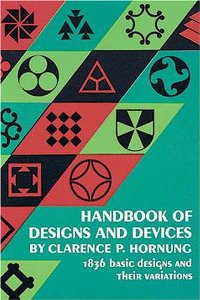 If you’re intrigued by patterns, ornament and design and their variations, Clarence P. Hornung’s Handbook of Designs and Devices, “by one of America’s foremost industrial and graphic designers” is a wonderful reference to have on your bookshelf.
If you’re intrigued by patterns, ornament and design and their variations, Clarence P. Hornung’s Handbook of Designs and Devices, “by one of America’s foremost industrial and graphic designers” is a wonderful reference to have on your bookshelf.
Though originally published in 1932 by Harper Brothers, it has been revised and updated since and its contents are still contemporary. There isn’t a great deal of text apart from the Introduction and the “Notes on Plates”. Though you may find the writing style a bit old fashioned, I find it charming and more importantly, very informative.
The chapters are well organized and are primarily pages (“plates”) of images (1,836 “figures”) showing basic forms and their variants. Quoting extensively from the back cover because it details the contents of the book well:
“Representing the results of many years of patient, scholarly study by the author, along with much practical experience in using this material, the book provides large, clear reproductions of the most diverse and usable variations and combinations of such basic forms as:
-
- The Circle (crescent, sector, segment, ring, trefoil, quatrefoil)
- The Line and Band (wavy, zigzag, plaid, lattice)
- The Triangle (triangular variants, the arrow head, chevron, triquetra, trisklion)
- The Square (the rectangle, checker combinations, rectangular interlacements, the diamond, rhombic variants)
- The Cross and Its Many Variants
- The Pentagon, Hexagon and Octagon (six-pointed star, Solomon’s Seal, the snow crystal)
- The Scroll (spiral scroll, wave scroll, the curvilinear motif, the monad, triad, loop)
- The Fret and Rectangular Motif [Note: I’ve previously quoted from this book about the fret, here.]
- The Shield
To achieve a successful presentation of the most valuable geometric forms in the common store of decorative design, the author has drawn upon ancient Egyptian, Grecian, Roman, Arabian and Japanese as well as upon the most successful of modern motifs.”
The Handbook is a soft-cover book containing 261 pages and it about 8 x 5.5 inches. As a reviewer writes, “I often use it when I go out for a café, and scribble all kinds of designs while sipping my coffee. The book really stimulates the mind, geometrically. And the black/white neat presentation makes it just right. In fact, it is perfect for the purpose of taking along to really *use* and work through, – while you keep all those shiny, glossy grand reference books at home on the bookshelf.”
If you are a student of design or simply wish to have a handy resource of ideas to enhance your Zentangle creativity, I highly recommend Clarence Hornung’s Handbook of Designs and Devices.
For your Zentangle Library
Check out Amazon for the currently available Zentangle-related books.
|
.oOo. |
|
Enhance your Zentangle experience while supporting TanglePatterns: |
|
BRAND NEW! TanglePatterns.com TANGLE GUIDE, 2026 Edition |
|
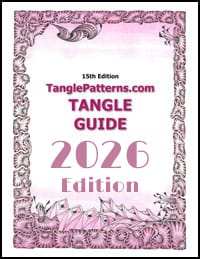 |
The 15th Edition of the TanglePatterns.com TANGLE GUIDE is an instant-download 123-page interactive digital eBook/PDF containing over 2,300 tangles on the site from May 2010 through December 31, 2025. It's a great resource and a must-have digital tool for using the site. Visit the STORE > E-BOOKS page and help keep TanglePatterns.com going by getting your copy now! |
|
"Linda, Thank you! I was relying on too few and getting stuck after 3 years of daily working with Zentangle. This has inspired me to ‘begin again’ with renewed excitement." ~ Barbara R. |
|
| See the BOOK REVIEWS page for more details on its features and view a sample page. Note: this is a digital product to download immediately when ordering, nothing will be physically mailed to you. | |
| If you're new to Zentangle® and tangling, my TanglePatterns.com BEGINNER'S GUIDE TO ZENTANGLE is just what you need to get started. Also available en Français and en Español. | |
|
|
|
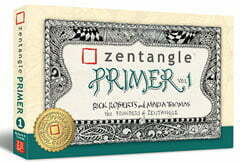 |
This is the only Zentangle book you'll ever need: the fabulous Zentangle PRIMER Vol 1. It's your CZT-in-a-book by the founders of Zentangle®. For more about the content and to read the rave reviews, visit the BOOK REVIEWS tab. |
| Available in KINDLE format for $9.99. Spanish Edition here. Japanese Edition here. | |
| "Absolutely the best Zentangle Book yet! As an accomplished artist I used to think I did not need instruction on this art form. How wrong I was! My tangling improved by leaps and bounds after reading this book. If you think you have Zentangle down then you need this book more than ever!" ~ Kris H | |
|
|
|
|
.oOo. |
|

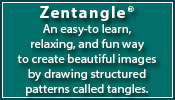
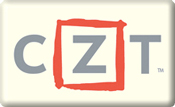

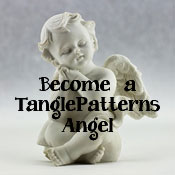
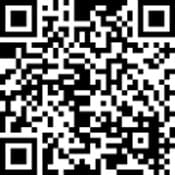
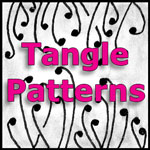
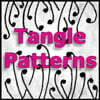
RECENT COMMENTS